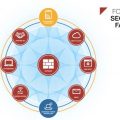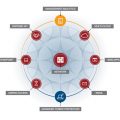The advent of digital marketing completely changed how businesses interact with their target audiences. Businesses can quickly acquire massive quantities of consumer data and use it to tailor marketing efforts and enhance user experiences thanks to the proliferation of digital channels and technologies. Privacy issues are growing in significance as companies gather more and more customer data.
Millions of consumers’ private information has been compromised due to multiple high-profile data breaches in recent years. In light of these events, consumers are more wary about providing their personal information over the Internet than ever.
Protecting your customers’ personal information should be a top priority if you’re a digital marketer. Here are some examples of why protecting your customer’s personal information online should be a key priority:
Define Data Security
The practice of preserving digital information across its entire life cycle to defend it against corruption, theft, or unauthorized access is known as data security. It encompasses everything, including organizations’ policies and processes, technology, software, storage, and user devices.
Data security employs techniques and technology that improve the visibility of a company’s data and its usage.
These programs may secure data by concealing, encrypting, and redacting sensitive information. Additionally, the approach assists organizations in streamlining their auditing operations and adhering to increasingly severe data security rules.
Business data may be shielded from assaults with the help of a solid data security management and planning procedure. Data breaches continue to occur, but this helps reduce the likelihood of those occurring due to human error and insider threats.
The Elements of Data Security
Data security has three pillars: privacy, integrity, and accessibility. These ideas can be referred to as a security paradigm and framework or simply as the CIA Triad. What does each of these fundamental components entail in terms of preventing hackers from gaining access to your system and stealing your data?
- Confidentiality. Protects data by limiting access to those who have been granted permission.
- Availability. Ensures that data can be quickly accessed and made available for use in a safe way to meet the continuing requirements of the business.
- Integrity. Check to see that all of the data that has been saved is trustworthy and accurate and has not been subject to any modifications that were not justified.
Types of Data Security
Encryption
Encryption keys scramble data so only authorized users may read it using an algorithm to change regular text characters into an unreadable format. Encryption software for files and databases is the last defense against unauthorized access to sensitive data. Security key management is a feature included in most systems.
Data Erasure
Regular and secure data disposal is essential. Data erasure is a more secure alternative to simple data wiping in which software repeatedly wipes data on a storage device. Erasing data ensures it can never be recovered and is safe from prying eyes.
Data Masking
Anonymized data has potential business uses, such as software engineering and staff education. During development, sensitive information is concealed wherever necessary to guarantee that only compliant environments are utilized.
Authentication
Like access restrictions, authentication ensures that only authorized individuals may see sensitive information. Passwords, PINs, security tokens, swipe cards, and biometrics are all examples of this kind of protection.
Backups and Recovery
A good data security strategy will ensure that data can be accessed safely in the event of a data breach, data corruption, or system failure. It is recommended that you backup a copy of your data in another format, such as a hard drive, a local network, or the cloud, just in case you ever find yourself in a situation where you need to restore it.
Access Controls
Data security methods of this sort include restricting both physical and digital access to sensitive infrastructure and information. All computers and other electronic devices should have password protection, and only authorized people should be able to reach restricted areas.
Data Resiliency
Several factors may negatively impact data availability, including hardware failure, power outages, and other unforeseen circumstances. Rapid rehabilitation is essential for damage control.
Common Data Security Threats You Should Avoid
Insider threats
Business end users, either present or former employees, third-party partners, or contractors, seriously threaten data security. Whether for financial gain or to settle a grudge, malicious insiders may abuse their position of trust by corrupting or stealing important information.
Misconfigurations
Business end users, whether current or former employees, third-party partners, or contractors, constitute a severe threat to the confidentiality of sensitive company information. Malicious insiders may misuse their trusted position to steal or manipulate sensitive data for personal benefit or to get even with others.
Third-party threats
A corporation’s security level is only as good as that provided by its most vulnerable third-party partner, regardless of whether that partner is a customer, provider, or contractor. Consider the infamous Solarwinds supply chain problem, in which threat actors could potentially attack the networks of the vendor’s customers.
How to Secure Data?
Identify and search for crucial data.
To properly secure your data, you must first recognize its many forms. Start by having your security team scan your data stores and provide reports on what they uncover. They may then categorize the information depending on its importance to the business.
The categorization may be updated as data is generated, edited, processed, or sent. It would be beneficial if you devised regulations prohibiting users from inflating the degree of categorization. Only privileged users, for example, should be able to upgrade or downgrade the data categorization.
Make use of endpoint security solutions.
Your network’s endpoints are constantly under threat. Therefore, it’s crucial to have a solid endpoint security architecture to prevent any potential data breaches. Antivirus programs, pop-up blockers, firewalls, and antispyware are all excellent places to start.
Use multifactor authentication.
One of the most cutting-edge and tried-and-true data security methods is multifactor authentication. It is effective because it strengthens the first authentication process. It implies the hacker will need more than just your password to get access; they’ll also need more, such as a security token, fingerprint, voice recognition, or cell phone confirmation.
A data usage policy is a must.
Designing an effective access policy for your data is essential since more than merely classification is required. The plan must explain who can gain entry to which classified details. Manage user permissions for selected locations and shut down when the task is completed.
Train your workers
Share your company’s cybersecurity rules and procedures with your staff. Regular training will ensure your staff is up-to-date on global standards and practices. Show them actual security breaches and get their opinions on your present measures.
Conduct change management and database audits.
An excellent way to improve your system’s security is by logging all activities in your databases and file servers. To comply with security audit regulations, it is necessary to preserve the login activities records for at least one year.
A user account that surpasses the maximum number of failed login tries must be immediately notified to the Information Security Admin, and to be able to spot changes in sensitive information as well as the related authorization is critical. Effective security policy creation requires historical analysis of sensitive data usage to determine what information needs protection and anticipate changes that might impact security.
Why is data security important?
The importance of data security to businesses across all sectors and all over the globe cannot be overstated. Companies are responsible for preventing sensitive user and customer data from being stolen.
Here are some instances that show why protecting your customers’ personal information online should be a key priority:
Build trust
Companies that value their customer’s privacy and take precautions to keep their information secure earn the confidence of their customers. Building trust with customers and earning loyalty requires a demonstrated dedication to protecting their personal information.
Avoid legal and regulatory issues.
The gathering and use of an individual’s personal information are regulated by stringent rules in many nations. If businesses do not adhere to these demands, they risk suffering significant penalties and reputational harm. Protecting the privacy of your customers’ information may help you avoid running into legal and regulatory trouble.
Secure brand reputation
A data breach may have devastating effects on public opinion of your company. If your clients’ private information is stolen or compromised, you risk losing their confidence and, by extension, their business. Maintaining your customers’ confidence and loyalty depends on your commitment to secure their personal information.
Final Thoughts
Data security recommendations aren’t limited to the preventative measures listed above. There’s more to it, such as frequent backups of all data, encryption in transit and at rest, mandating secure password practices, and so on.
However, it is best to recognize that cybersecurity is not about eradicating all threats—this is impossible. Moreover, it’s not something you can disregard. Taking all necessary precautions may significantly lessen potential dangers.
AUTHOR:
Jennysis Lajom is an IT graduate, a chemist, an eCommerce business owner, and a Korean drama fan. Her passion for digital marketing led her to a career in graphic design, editing, and social media marketing. She is also one of the resident SEO writers from Softvire, a leading IT distributor in Sydney. Follow her at Softvire Online Software Store now!






